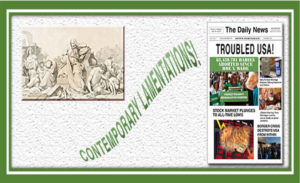 Contemporary Lamentations! Lamentations—a book likely rarely studied by most Christians—is one the LORD has recently laid upon my heart. Jeremiah, believed to be the penman of Lamentations, also wrote the book named Jeremiah. He was given the task of telling the Israelites for 40 years the harsh truth—that they and their country would be destroyed; they would suffer extreme physical hardship, if they did not repent.
Contemporary Lamentations! Lamentations—a book likely rarely studied by most Christians—is one the LORD has recently laid upon my heart. Jeremiah, believed to be the penman of Lamentations, also wrote the book named Jeremiah. He was given the task of telling the Israelites for 40 years the harsh truth—that they and their country would be destroyed; they would suffer extreme physical hardship, if they did not repent.
What does God require?
 Guess what? Jeremiah, had NO converts—no one believed him enough to turn from sinful lifestyles (repent). Repentance was the same then as it is today—to turn from sin and to follow Jesus. Sin includes idolatry (making anything more important than God, such as the pursuit of career and financial gain and the desire for personal acclaim; or even the pursuit of leisure—at the expense of replacing church attendance and personal Bible study with leisure activities).
Guess what? Jeremiah, had NO converts—no one believed him enough to turn from sinful lifestyles (repent). Repentance was the same then as it is today—to turn from sin and to follow Jesus. Sin includes idolatry (making anything more important than God, such as the pursuit of career and financial gain and the desire for personal acclaim; or even the pursuit of leisure—at the expense of replacing church attendance and personal Bible study with leisure activities).
And there are the many faces of sinful lust, such as fornication (including shacking up instead of  getting married before partaking in sexual intimacy) and adultery (including that described in Luke 16:18 and Romans 7:2-3). God also abhors lying and cheating, unforgiveness and bitterness; and He doesn’t overlook robbing Him—as we’re reminded by Malachi—in tithes and offerings. God doesn’t NEED our resources, but … we NEED to share them.
getting married before partaking in sexual intimacy) and adultery (including that described in Luke 16:18 and Romans 7:2-3). God also abhors lying and cheating, unforgiveness and bitterness; and He doesn’t overlook robbing Him—as we’re reminded by Malachi—in tithes and offerings. God doesn’t NEED our resources, but … we NEED to share them.
Forty years and no fruit?
Can you imagine preaching the SAME message for 40 years and having NO converts? Yes, that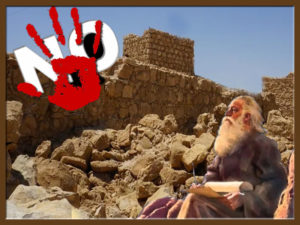 was not only Jeremiah’s ministry history, but he was also greatly persecuted and rejected by those to whom he was giving God’s life-line message of salvation versus the choice to suffer God’s chastisement for the rejection of the LORD and His principles. So was Jeremiah’s ministry a failure—because he didn’t have a huge congregation and couldn’t log in a long list of attendees or followers? No, God isn’t and wasn’t looking for numbers; instead, what He expects is faithfulness to Him in all spheres of our lives and work.
was not only Jeremiah’s ministry history, but he was also greatly persecuted and rejected by those to whom he was giving God’s life-line message of salvation versus the choice to suffer God’s chastisement for the rejection of the LORD and His principles. So was Jeremiah’s ministry a failure—because he didn’t have a huge congregation and couldn’t log in a long list of attendees or followers? No, God isn’t and wasn’t looking for numbers; instead, what He expects is faithfulness to Him in all spheres of our lives and work.
Like us today, Jeremiah’s contemporaries came to the temple (church), offered sacrifices and called on the name of the Lord, but they failed to acknowledge God in the way they lived their lives. Many attended “church,” placed their tithes and offerings in the collection plate, and even confessed their sins; however, they lived their lives as though God were not involved.
This greatly grieved Jeremiah as he knew what would be coming upon his friends and neighbors—the reality of what he repeatedly warned would happen for rejecting God. Thus, the eye-witness account by Jeremiah, preserved in the book of Lamentations, painfully chronicles what became a reality in the lives of the Israelites.
Surely, what happened to God’s chosen people could not happen to us—or could it? Is the “writing on the wall,” but we overlook it?
Jeremiah graphically recorded the dire reality.
Jeremiah graphically wrote in the book of Lamentations: How doth the city [Jerusalem] sit 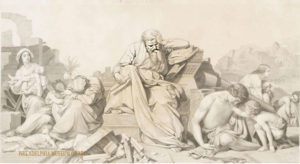 solitary [deserted], that was full of people! … that was great among the nations; she weepeth sore in the night, and her tears are on her cheeks … her gates [borders] are desolate; her virgins are afflicted [raped]; the young and the old lie on the ground in the streets; they that were brought up in scarlet [riches] embrace dunghills …
solitary [deserted], that was full of people! … that was great among the nations; she weepeth sore in the night, and her tears are on her cheeks … her gates [borders] are desolate; her virgins are afflicted [raped]; the young and the old lie on the ground in the streets; they that were brought up in scarlet [riches] embrace dunghills …
The hands of the pitiful women have sodden [boiled] their own children: they were their meat … he [God, using the hand of their enemy] hath violently taken away his tabernacle … he hath destroyed his places of the assembly … The Lord hath cast off his altar, he hath abhorred his sanctuary …
(Above Scriptures are from Lamentations, Chapters 1, 2, and 4.)
Jerusalem had been blessed with riches and pleasures of life, yet …
Israel “forgat” the covenant they had with their God and the attendant blessings which flowed from that agreement. They turned to other gods and enemy nations and pursued the pleasures of sin—for a season! Thus, Jeremiah, the weeping prophet, wrote as he sat on a hill overlooking the total destruction of his dear city Jerusalem, once rich and prosperous and a leader among nations,
He heard the painful cries of desperation of the young and old as they were being persecuted, as they were dying from hunger—the adults were so desperate for food that they were eating their own children.
How could you, Israel, eat your children?
How could you USA …

What does panorama’s mirror reflect for our admonition?
Now how barbaric was that? Really?
We read in unbelief: “The Israelites ate their own children,” as we sit in the comfort of our homes and judge what we cannot conceptualize: How could they?
On the other hand … can we perhaps not recognize similar behaviors in the lives of our own countrymen but manifest differently?
The United States has been blessed with riches and pleasures of life, yet …
Are not our headlines vying for sadistic attention with no remorse? For example, what about  those who fight for and against killing children in the womb! After all, we are “righteous” as some horrifically, sinfully bellow, “We have a right to enjoy our reprobate behaviours.”
those who fight for and against killing children in the womb! After all, we are “righteous” as some horrifically, sinfully bellow, “We have a right to enjoy our reprobate behaviours.”
Woe unto the world because of offences! for it must needs be that offences come; but woe to that man by whom the offence cometh! Matthew 18:7 Before I [God] formed thee in the belly I knew thee … Jeremiah 1:5
(However, those who have aborted a child must know that God forgives when there is true repentance: He that covereth his sins shall not prosper: but whoso confesseth and forsaketh them shall have mercy. Proverbs 28:13)
Was God being unjust? NEVER.
 How did all this happen—that Jerusalem was destroyed? Who was responsible? It was Father God’s hand. He, as a righteous Parent, MUST punish His children (including us) for disobedience; thus, did our just God do for His children, the Israelites.
How did all this happen—that Jerusalem was destroyed? Who was responsible? It was Father God’s hand. He, as a righteous Parent, MUST punish His children (including us) for disobedience; thus, did our just God do for His children, the Israelites.
God PROMISED very clearly and repeatedly for YEARS what would happen if Israel (His children) chose lifestyles of sin. Jeremiah preached against it for 40 years but to no avail.
The LORD makes it clear that the tragedy recorded in Lamentations was not an accident. It was authored by Him for a specific reason: He MUST judge sin as He said He would. To validate, the LORD is referred to by name or pronouns (he/his) almost 50 times in Lamentations 2:1-10! Read and count for yourself.
God is a just God. He sent many prophets, over hundreds of years, to warn the people that sin has a price that must be paid. The wages of sin is spiritual death, but sin also has physical ramifications.
Sin looks and feels good for a season, but eventually there is destructive poison in what might  appear to be a yummy chocolate-covered candy or that God-defined forbidden lustful relationship.
appear to be a yummy chocolate-covered candy or that God-defined forbidden lustful relationship.
The book of Lamentations, in a dual scenario, clearly reminds all who read it not only of the desolation resulting from sin but the reason for the desolation—the hard-hearted people refused to turn from their sinful lifestyles; and thus, chastisement was their reward. However, included clearly within this doom and gloom book is God’s ever constant reminder that he MUST punish unrepentant sin; yet, He is always waiting for those who have gone astray to return to Him. He that covereth his sins shall not prosper: but whoso confesseth and forsaketh them shall have mercy. Proverbs 28:13
Jeremiah laments; the once beautiful city of Jerusalem is now burned and its protective, seemingly impenetrable wall, is broken down; poverty is so extreme that children are killed and eaten for food; those once revered for their appearance are now naked, trodden down, and forced to do manual labour.
The “WHY?” is clearly answered. The Scripture is very specific. It was pre-told; it was judgment from God who ... is not a man, that he should lie; neither the son of man, that he should repent: hath he said, and shall he not do it? or hath he spoken, and shall he not make it good? Numbers 23:19
What God says, as recorded by Jeremiah, is what He, as a righteous God, must do: … the LORD hath done that which he had devised; he hath fulfilled his word … for the LORD hath afflicted her for the multitude of her transgressions… Jerusalem hath grievously sinned … he [God] hath violently taken away his tabernacle [the once highly revered place of worship as it too had been defiled with sin] … the stones of the sanctuary are poured out on the top of every street. (Verses from Lamentations, Chapters 1, 2, and 4.)
Yes, His children, the Israelites, were even deprived BY GOD of the privilege to worship in their beloved sanctuary (Read verses 2:6-7.). Yet, how many today, especially on days off from their jobs, feel they do not have time to attend worship services or to study the Bible; to help others in need; to visit shut-ins? Do we forget that it is a privilege to go into the house of the LORD and to serve others?
Not forsaking the assembling of ourselves together,
as the manner of some is … Hebrews 10:25
There is remedy for the repentant soul.
Yet, no matter how difficult things get, there is HOPE, Jeremiah writes. The LORD is always waiting in the wings for the return of His people (His children—including you and me) to Him. Jeremiah reminds the workman who studies of God’s unconditional love.
This I [Jeremiah] recall to my mind, therefore have I hope. It is of the LORD’s mercies that we are not consumed, because his compassions fail not. They are new every morning: great is thy faithfulness. The LORD is my portion, saith my soul; therefore will I hope in him. The LORD is good unto them that wait for him, to the soul that seeketh him. It is good that a man should both hope and quietly wait for the salvation of the LORD. It is good for a man that he bear the yoke in his youth. Lamentations 3:21-27
There are forgotten covenants.
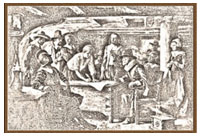 Sadly, God’s chosen people did not choose Him. They, instead, looked to Egypt and other enemy nations for help and their security. They forgot the covenant God made with Abraham, just as our country has set aside the covenant under which America was founded. Do you recall what that was? You may want to revisit our video on the founding of America, Thanksgiving, Why in America: https://www.restorationofthefamily.org/thanksgiving-why-in-america/
Sadly, God’s chosen people did not choose Him. They, instead, looked to Egypt and other enemy nations for help and their security. They forgot the covenant God made with Abraham, just as our country has set aside the covenant under which America was founded. Do you recall what that was? You may want to revisit our video on the founding of America, Thanksgiving, Why in America: https://www.restorationofthefamily.org/thanksgiving-why-in-america/
We URGE you to click on the link and view the above presentation.
We have a wonderful heritage.
The pilgrims went before us and made a covenant (Compact) by which every Christian should  live. Important to us, and our loved ones, is what the Pilgrims wrote and to what they covenanted to God to uphold. This was before they walked off the Mayflower and stepped upon what they named Plymouth Rock (so called after their last place of port in England). They drew up and signed the Mayflower Compact. It was through this document that they put in writing for a permanent record—their purpose for coming to this land: … having undertaken for the Glory of God, and Advancement of the Christian Faith.
live. Important to us, and our loved ones, is what the Pilgrims wrote and to what they covenanted to God to uphold. This was before they walked off the Mayflower and stepped upon what they named Plymouth Rock (so called after their last place of port in England). They drew up and signed the Mayflower Compact. It was through this document that they put in writing for a permanent record—their purpose for coming to this land: … having undertaken for the Glory of God, and Advancement of the Christian Faith.
Sadly, many have turned from the covenant for which our nation was established; and, we are “reaping” the fallout!
Isn’t it tragic how we as a nation, and individually, have turned from the vision and purpose for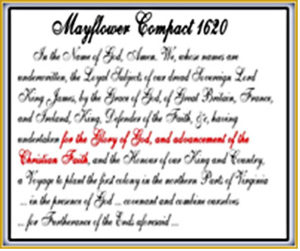 which this country was established? In fact, most citizens aren’t even aware of the words penned within the Mayflower Compact that so powerfully and succinctly expressed the heart of the devoted survivors: “… Having undertaken for the Glory of God and advancement of the Christian faith …” The Pilgrims drew up and signed a covenant to honour God.
which this country was established? In fact, most citizens aren’t even aware of the words penned within the Mayflower Compact that so powerfully and succinctly expressed the heart of the devoted survivors: “… Having undertaken for the Glory of God and advancement of the Christian faith …” The Pilgrims drew up and signed a covenant to honour God.
So—what can I do?
- Examine yourselves, whether ye be in the faith … 2 Corinthians 13:5 Compare Lamentations 3:40.
- Stand strong for God’s one-flesh marriage covenant. If I’m divorced legally from a one-flesh covenant spouse, continue to love him/her, praying that he/she will be saved, and there will be reconciliation, knowing … The wife is bound by the law [of marriage] as long as her husband liveth; but if her husband be dead, she is at liberty to be married to whom she will; only in the LORD. (The nouns wife and husband include both sexes: The husband is also bound by the law as long as his wife liveth …) 1 Corinthians 7:39 Spouses commit to love one another until physical death they do part.
- Pray for our leaders to return to the principles recorded in the Mayflower Covenant (Compact)—to embrace the advancement of the Christian faith with its principles and statutes.
- Commit regularly to Study to shew thyself approved unto God, a workman that needeth not to be ashamed, rightly dividing the word of truth. 2 Timothy 2:15
- Do the works of God’s statutes and precepts: But wilt thou know, O vain man, that faith without works is dead? James 2:20
- Go ye therefore, and teach all nations, baptizing them in the name of the Father, and of the Son, and of the Holy Ghost: Teaching them to observe all things whatsoever I have commanded you … Matthew 28:19-20
- Review and abide by God’s law: … to observe to do all his commandments and his statutes … Deuteronomy. 28:15
8. … earnestly contend for the faith which was once delivered unto the saints. Jude 1:3 Ye shall not add unto the word which I command you, neither shall ye diminish ought from it … Deuteronomy 4:2
Do not partake in changing the words of the Bible.
If you have questions, need prayer, or would like to be added to our free email teaching distribution list, please contact us. We are blessed when we hear from you: RestorationOfTheFamily@gmail.com or Restoration Of The Family, PO Box 621342, Oviedo FL 32762; www.RestorationOfTheFamily.org
In Christ’s Service,
Judith Brumbaugh
Founder/President, Restoration of the Family, Inc.
P.S. We hope that you completed the Bible Study: Lamentations: Rebellion’s Price. Let us know if you need a copy of it.

